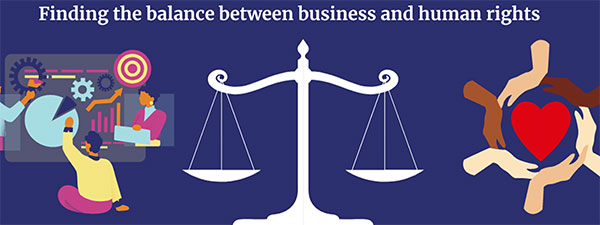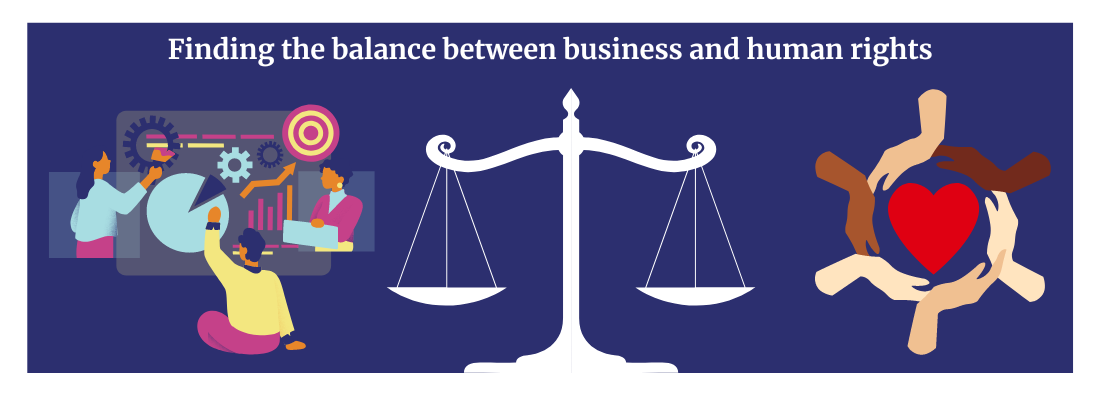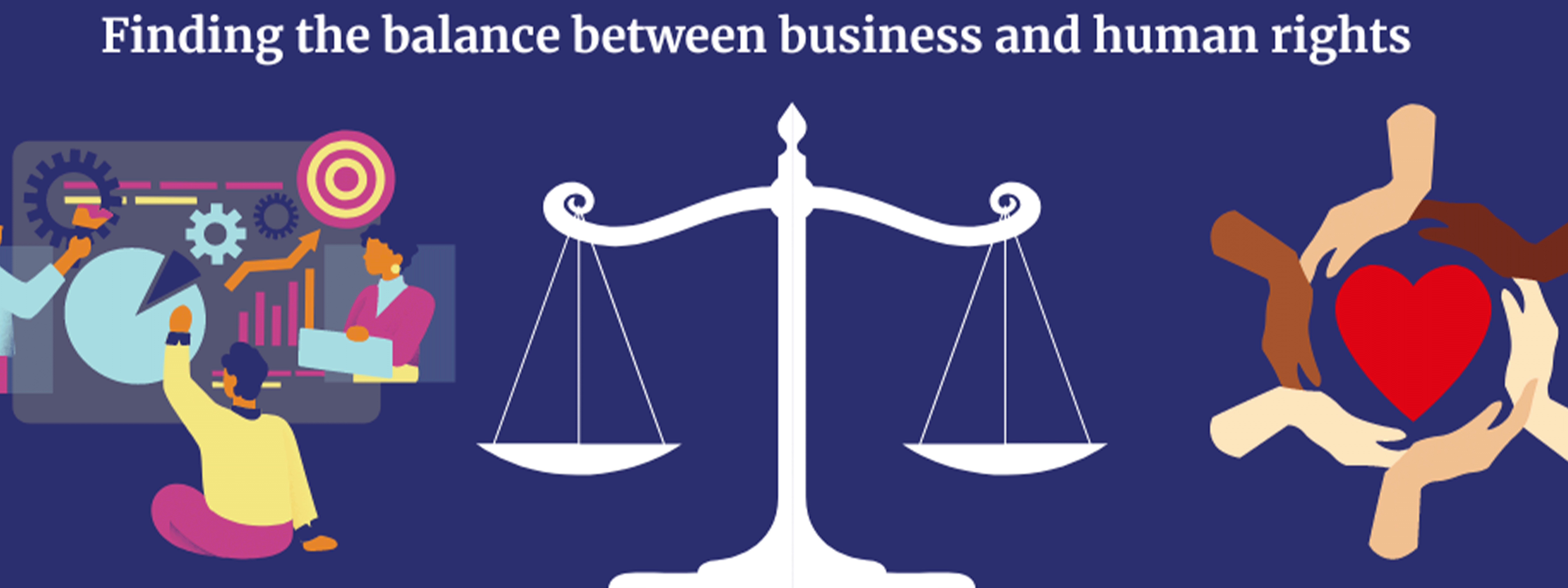|
|
The 28th issue of the International Bar Association’s Human Rights Institute (IBAHRI) Covid-19 Human Rights Monitor includes increased calls to domestic violence hotlines during the pandemic, displaced refugees and violence against peaceful protestors.
Buses will be leaving the JW Marriott at 18:45. Return transport from the JW Marriott will be provided.
17th Annual Bar Leaders' Conference
The 22nd edition of the IBAHRI Covid Monitor includes coverage of the United Nations General Assembly resolution encouraging international cooperation, measures to combat rape in Liberia, LGBTQI+ rights in Southern Africa, Tajikistan and Iraq, effects of the fire at Moria refugee camp in Lesbos, reports of dangerous medical practices at an Immigration and Customs Enforcement facility in the US, homelessness and Covid-19 in the Middle East, Germany and Chile, and furlough schemes and disability.
The latest issue of the Monitor covers topics including Covid-19 outbreaks in refugee camps, prisons and detention centres. Also: the lasting impact of the pandemic on individuals with disabilities and on children without access to education.
Navigating ESG challenges in AI
18. EU Digital Services Act
19. Utilising AI in M&A deals
20.
7th Mergers and Acquisitions in the Technology Sector Conference
On 15 January 2020 the Austrian Supreme Court considered whether a final arbitral award on its merits violated Austrian public policy (Case: OGH 18 OCg 9/19a). The underlying arbitration was conducted under the rules of the Vienna International Arbitral Centre (VIAC) with seat in Vienna.
Aug 11, 2022
Eighteen months after Myanmar’s military seized control and arrested then-leader Aung San Suu Kyi, alongside other members of the democratically-elected National Unity Government (NUG), the international community grapples with how to treat the country. As things stand, there’s no sign of an end to the junta’s bloody and contentious rule.
This article focuses on a ruling of the Court of Justice of the European Union concerning the competence of the Independent Supervisory Authorities to determine of airport charges. Through analysis of the ruling in question and identification of the peculiarities of the Italian system, this article provides an overview of the main legal barriers to the implementation of Directive 2009/12 on airport charges.
Regulation of tech related M&A transactions (including notification duties, investment protection, AI aspects)
18. Startup acquisitions
19. W&I latest developments
20.
8th Mergers and Acquisitions in the Technology Sector Conference
Feb 17, 2023
This article will outline the development of China’s restrictions on the cross-border transfer of personal information (PI export), detailing PI export mechanisms provided by the Personal Information Protection Law. It will also explain the practical implications of the restrictions.

Sep 27, 2023
The rise in popularity of generative artificial intelligence (‘generative AI’) has ignited the discussion on whether junior employees can be replaced by it. Some have gone to the extent of questioning whether professionals, such as lawyers, can also be replaced by generative AI. Is it wise to replace junior employees or lawyers with generative AI? What factors should be considered before deploying generative AI tools in your business? To consider these questions, we first need to understand the basic workings of generative AI and what it can offer. Fundamentally, AI is intelligence that is not biological. The general understanding is that machines will be ascribed with this intelligence. These machines have the ability to interpret, learn from and process external data in a way that is similar to the capabilities of the human mind. Generative AI is a type of AI program that generates content from a data set. It uses deep learning, a type of machine learning system that behaves like a neural network to simulate the functions of a human brain. In other words, it can mimic human intelligence by exhibiting analytical skills to create new content. Not only can generative AI be utilised in chatbot programs to create text, but it can also be used in programs that can create images, sound or videos. This article will consider two major forms of generative AI, in the context of risks to businesses: chatbots using generative pre-trained transformer technology programs; and image generating programs.
Apr 22, 2022
This article discusses the recent SEC case involving PwC and highlights the wider implications for intermediary institutions providing professional services in a tightened regulatory and enforcement regime in China’s banking and financial sector.
Jun 12, 2024
The new Foreign State Immunity Law 2023 of the People’s Republic of China came into force on 1 January 2024. This shifts the country (as well as its special administrative regions, Hong Kong and Macau) away from absolute state immunity to restrictive state immunity, bringing it more in line with the relatively prevalent practice among the international community. This article discusses the status of state immunity in public international law, analyses the new law’s provisions and examines practical challenges that will be faced by those seeking to utilise this law to enforce judgments or awards against foreign states and state entities, and the new law’s innovations that go beyond the United Nations Convention on Jurisdictional Immunities of States and Their Property of 2004 and the UK State Immunity Act 1978.
The first webinar of the virtual conference focused on practical advice for lawyers and their firms on how to navigate the current economic crisis.
Jan 13, 2022
A report on a survey created by the Diversity and Inclusion Working Party of the IBA European Regional Forum to understand how Diversity & Inclusion is perceived by European law firms and to try to learn from each other’s experience.
Elizabeth Morley
Rajesh Sreenivasan
Media Law Committee
_ _ _ _
18. Hot topics in Space Law
Sustainability of space activities – current and future.
IBA Annual Conference Mexico City 2024
Kristian Skovgaard Larsen and Alexander Grønlund highlight a few of the many changes and additions to the new Danish general conditions in construction contracting that entered into force on 1 January 2019.
On 1 June 2020, new VAT rules entered into force in Mexico to regulate and tax the digital economy. These rules are based on the Organisation for Economic Cooperation and Development (OECD) conclusions to Action 1 of the Base Erosion and Profit Shifting (BEPS) Project and the work conducted by Working Party No 9 on Consumption Taxes.
Apr 25, 2022
Putin’s invasion of Ukraine has prompted international legal service providers to shut down operations in Russia, marking a palpable shift in the sector. If law firms do not re-examine their ethical standards and the moral standing of their clients, regulators may do it for them.
May 14, 2024
After the Reserve Bank of India issued notices to a few ‘foreign owned or controlled’ Indian companies for deferring part of the consideration payable in regard to their downstream investments in other Indian companies, Indian transaction advisors are faced with a dilemma. Structuring deals with deferred consideration for acquisitions through ‘foreign owned or controlled’ Indian companies has become a risky proposition. This article argues that a complete ban on this practice is not only commercially impractical, but also potentially misaligned with the original regulatory intent.
Apr 06, 2023
Over the last year, Saudi Arabia has experienced a surge in FDI. In Q3 of 2022, FDI inflows to the tune of SAR 7.2bn (US$1.9bn) were reported by the Investment Ministry. This was an impressive surge compared to 2021, which saw SAR 6.5bn worth of investment during the same quarter. This 10.7 per cent growth in FDI inflows is a testament to the growing attractiveness of Saudi Arabia as an investment destination. By 2030, the Saudi Arabian government aims to reach US$100bn in annual FDI, an ambitious but achievable goal if current trends continue.
IBA members, past delegates, and newcomers – find essential information on booking and attending the conference here. Network with peers, learn from experts, and experience Canada – book your spot today!
Oct 12, 2021
Recent years have been pivotal in the development of collective redress in the courts of England and Wales. Claimant collaboration, or lack thereof, is likely to play a key role in deciding how successful many collective actions are in the coming years.
Oct 20, 2021
There is little guidance for arbitration practitioners on how personal data protection obligations should be complied with in international arbitration. In February 2019, the International Council for Commercial Arbitration (ICCA) and the International Bar Association (IBA) established a Joint Task Force on Data Protection in International Arbitration Proceedings. In March 2020, the Task Force published a consultation draft Roadmap that seeks to provide such practical guidance. This article, focusing specifically on the European Union’s General Data Protection Regulation (GDPR), serves as a commentary on this Roadmap in light of six pertinent issues regarding personal data protection in international arbitration.
The Association of Southeast Asian Nations (ASEAN) Experts Group on Competition (AEGC) is the regional forum for competition authorities in Southeast Asian. Recently, the AEGC of the ASEAN jointly called on all business sectors in Southeast Asia to continue to comply with competition law despite the current economic downturn. While forced to take transitory measures, such as extending timelines and taking applications and meetings online, the competition authorities in Southeast Asia remain committed
Due to the current circumstances and the uncertainly surrounding the coronavirus outbreak (Covid-19), the IBA has had to take the unfortunate decision to postpone the scheduled conferences listed below.
Apr 29, 2024
The article addresses the Brazilian ESG framework and, specifically, rules that should be observed by players active in the life sciences sector. Despite the lack of specific legal ESG criteria for different industry sectors in Brazil, there are some pieces of legislation and initiatives relating to environmental, social and governance aspects that should be observed by life sciences businesses.
By Emmanuel Moyne, Nima Haeri and Hubert Pouradier-Duteil. What is dead may never die: transfer of criminal liability from absorbed company to absorbing company following a merger
IBA Global Insight Aug/Sept 2018. Populations prey to a combination of political upheaval and autocratic regimes across the Middle East face appalling consequences. Global Insight assesses the troubling and persistent use of the death penalty, particularly for minors.
Apr 29, 2024
This article examines the regulatory and reimbursement landscape for gene therapies and or-phan drugs in Switzerland, with a focus on CAR-T therapy. As Switzerland navigates the inte-gration of these advanced treatments into its healthcare system, we explore the roles of Swissmedic and the Transplantation Act (the 'TA'), challenges in reimbursement, and the inno-vative approaches to pricing and market access. The article underscores the collaborative ef-forts between regulators, healthcare professionals, and the pharmaceutical industry, providing a comprehensive view for stakeholders at the World Life Sciences Conference and beyond.
Feb 20, 2024
The year 2023 brought significant changes to the Brazilian tax landscape, including, among others, the approval of a tax reform encompassing the taxation of consumption, the introduction of new taxes (IBS, CBS and IS) and the abolishment of others (PIS, COFINS, IPI, ICMS and ISS), as well as the alignment of the Brazilian transfer pricing rules with the Organisation for Economic Co-operation and Development’s (OECD) Transfer Pricing Guidelines for Multinational Enterprises and Tax Administrations through the conversion of Provisional Measure No. 1,152/2022 into Law No. 14,596/2023. This article provides a brief summary on the key changes from the past year and early 2024.
Jun 03, 2021
By Andrea Cruz and Gabriel Sira. The article reviews the treatment given by the Constitutional Chamber of the Venezuelan Supreme Tribunal of Justice to the arbitration, given its inclusion in the 1999 Constitution as a mean of alternative dispute resolution.
|


























